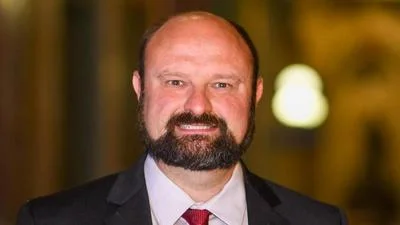Kevin Schmidt, candidate for the Illinois House to represent District 114 | Schmidt For Illinois/Facebook
Kevin Schmidt, candidate for the Illinois House to represent District 114 | Schmidt For Illinois/Facebook
With Jan. 1 approaching, local governments are preparing for the implementation of the SAFE-T Act. Counties are looking to raise taxes to balance budget deficits due to unfunded mandates in the bill. There are state’s attorneys who have begun the meticulous process of reviewing cases of people being detained pretrial to determine who will be released Jan. 1.
Meanwhile, state elected officials and candidates continue to battle over the right course of action moving forward. One hundred out of the 102 Illinois state’s attorneys have opposed the SAFE-T Act for various reasons. All Republican candidates and incumbents have opposed the bill, and numerous Democrats have either opposed the bill or stated the wording needs to be changed.
"The more we learn about the SAFE-T Act, the worse it gets," said Kevin Schmidt, candidate for state representative in the 114th District. "There is no question that habitual criminals will be released back on the streets with only their word that they will appear in court. There is bipartisan opposition among prosecutors and police officers to the SAFE-T Act. My opponent, LaToya Greenwood, sponsored this terrible legislation. When I get to Springfield, I will fight to keep our streets safe by fighting to repeal the SAFE-T Act.”
The SAFE-T Act is a controversial law passed by the Illinois State Legislature in January 2021 that deals with many aspects of criminal justice reform, including the banning of cash bail, prohibiting pretrial detention for several crimes and increasing training and equipment requirements for police departments. The bill passed the General Assembly and was signed by Gov. J.B. Pritzker bill a few days later.
The Illinois Criminal Justice Information Authority (ICJIA) website states that the SAFE-T Act enacts extensive reform impacting many areas of the criminal justice system, including pre-arrest diversion, policing, pretrial, sentencing and corrections.
The most controversial aspect of the SAFE-T Act is its elimination of cash bail in the state of Illinois. The bill noted it will be “presumed that a defendant is entitled to release on personal recognizance” and may be detained thereafter if they violate certain conditions listed in 725 ILCS 5/110-2.
The website Police 1 reported that among the major provisions of the SAFE-T Act is one that restricts the level of force officers may use while pursuing an offender or making an arrest if the officer reasonably believes the person can be apprehended at a later date. It will be illegal for law enforcement to shoot a taser at someone’s back, pelvis and head, which currently is a "recommended target" in all police officer training. Additionally, body cameras will be made mandatory for all law enforcement agencies by 2025. Under the law, officers cannot make custodial arrests for Class B misdemeanors which include criminal trespass and window-peekers. Instead of making an arrest, officers will be required to issue a citation and do not have the authority to remove a person from private or public property unless they are acting in a threatening manner.
Many localities are struggling to find the funding requirement to implement the SAFE-T Act. The Center Square reported the Kane County Board is discussing its first property tax hike in a decade, claiming they need it to fill a $3 million deficit created by unfunded mandated reforms in the SAFE-T Act.
Recently, State’s Attorney James Glasgow was asked about the SAFE-T Act in an interview with WGN10 Radio where he responded “the bottom line is the law [The SAFE-T Act] is unconstitutional.” Glasgow continued on to reference Article I Section 9 of the Illinois State Constitution, that states, “[a]ll persons shall be bailable by sufficient sureties,” except for capital offenses, death penalty, life in prison or felonies with mandatory prison.
Schmidt describes himself as a “strong conservative” and a father and husband with strong ties to the Metro East area. Schmidt’s priorities in Springfield will be job growth, resolving crime and fighting for tax reform.






 Alerts Sign-up
Alerts Sign-up